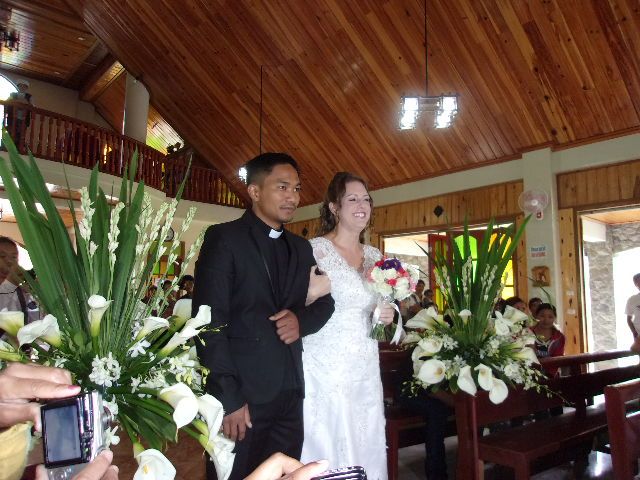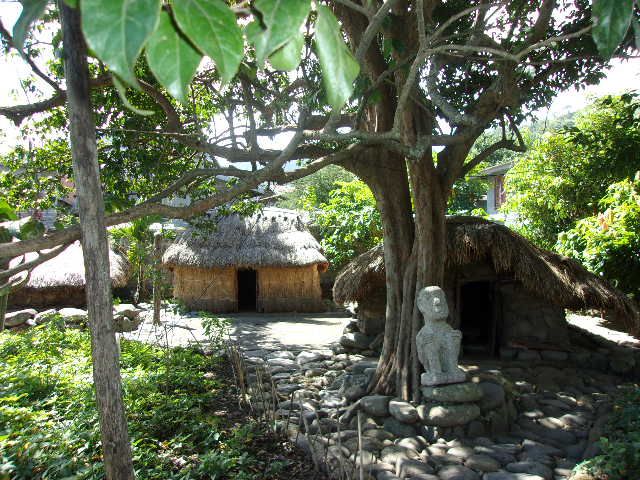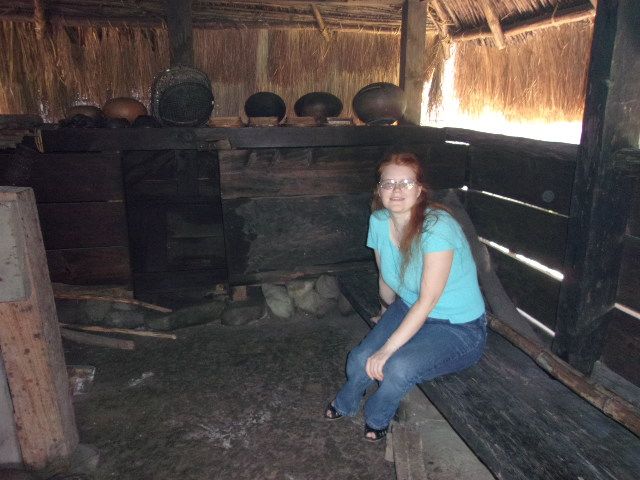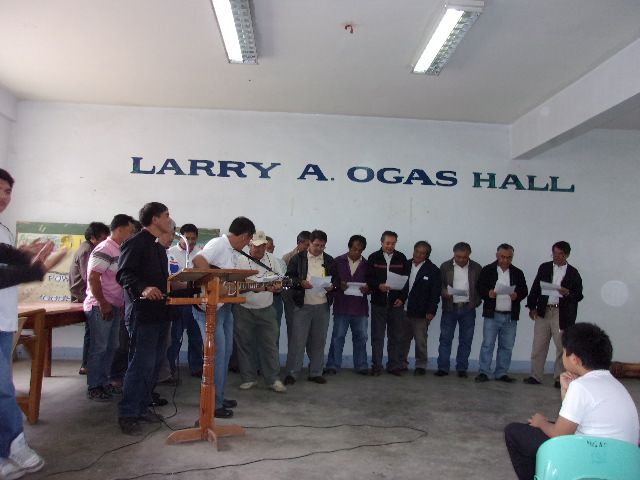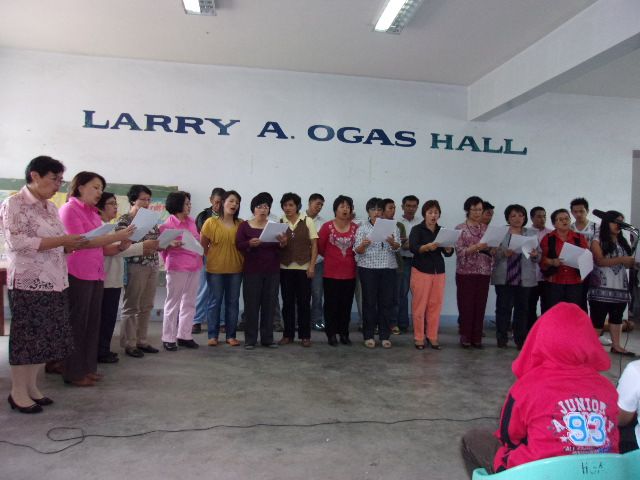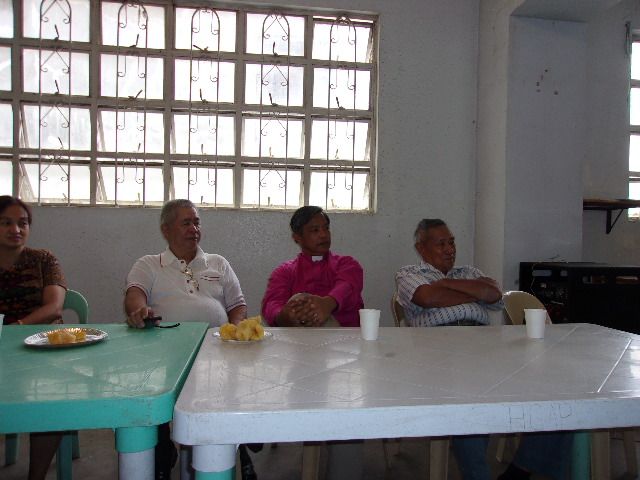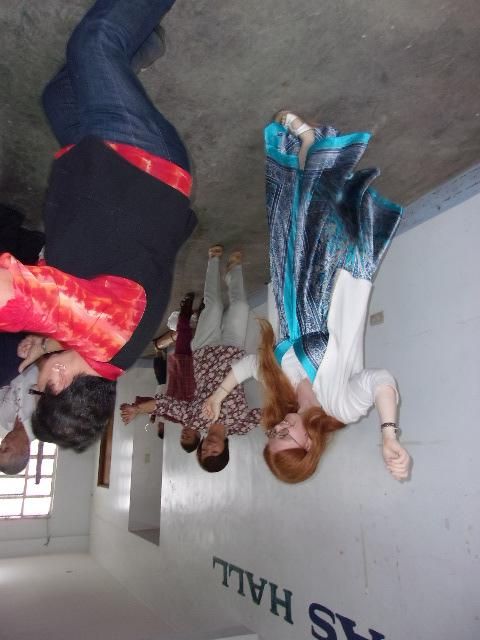It's no secret that I was originally assigned to the Diocese of the Southern Philippines. I was then transferred to the north out of some safety concerns, and given tensions on the island of Mindanao, as well as the earthquake centered in the southern islands, I have been just as glad to be up in the North Central Diocese instead.
But sometimes I can't help but wonder what it would have been like in the South.
This particular bout of wondering increased because I just spent two days at a conference/workshop of CE teachers from throughout the Philippines. The Episcopal schools in the Philippines are working to create a uniform, comprehensive curriculum for CE, and I was invited to attend the workshop being held here at Easter College. I spent the past two days living and working with other teachers from many of the other diocese, including a bunch from the south.
A group of teachers from Zamboanga City adopted me almost from the first, and made me feel like such a part of their group. After the first day was over in the early evening, they decided they wanted to tour parts of Baguio, and invited me along. We went to Burnham Park and played and took pictures there, including renting a boat and paddling around the pond inside the park. After that, we went to the Harrison Road Night Market, which is this giant street market that sells used clothing and various trinkets. It was a bit of a late night, and we all had to get up early the next morning for a 6:30 church service, but it was worth being tired just to be with everyone.
The next day was spent actually working on and critiquing the curriculum. There were some subjects I knew a lot about, hello medieval society, thank you for giving me a very thorough grounding in the medieval church, while with others I didn't have much to contribute to, as my knowledge of the history of the Episcopal Church in the Philippines is very surface level, but it was exciting to be a part of making this curriculum work for the years to come.
We finished in the early afternoon, and many groups headed out soon after, so they could get home in time for the feast of All Saints. I did get an invitation to come and visit the Southern Philippines, especially Zamboanga City, and I so want to go and see my new friends there again.
Wednesday, October 30, 2013
Sunday, October 27, 2013
Songs and Poems
Three weeks ago now, Ma'am Brigid, the president of Easter
College, invited me to come with her choir to a concert they were
doing in the lowlands, a benefit for San Gabriel the Archangel
Church. We were driven almost three hours down and three hours back,
and I rode with most of the alto section in one van.
The concert itself was amazing. I loved the music, and I want to kidnap their entire alto section and bring them back to the States to sing at Christ Church, because they were that good. I don't think I could fit the tenors into my bag as well as the altos, but they were also incredible.
As much as anything else, I enjoyed being part of the fellowship of the choir. Even with language barriers, it felt comfortable and easy being among choir people again.
On the way back up the mountain, darkness fell, and the choir members and I grew silent, simply being present with each other. This poem grew in my mind during the ride home, and was promptly written up before I fell asleep that evening:
The concert itself was amazing. I loved the music, and I want to kidnap their entire alto section and bring them back to the States to sing at Christ Church, because they were that good. I don't think I could fit the tenors into my bag as well as the altos, but they were also incredible.
As much as anything else, I enjoyed being part of the fellowship of the choir. Even with language barriers, it felt comfortable and easy being among choir people again.
On the way back up the mountain, darkness fell, and the choir members and I grew silent, simply being present with each other. This poem grew in my mind during the ride home, and was promptly written up before I fell asleep that evening:
Your shoulder leans against mine
as the road climbs up the mountain
I wonder, have our grounds now touched?
as the road climbs up the mountain
I wonder, have our grounds now touched?
When did I last lie in the grass?
This past summer, it was.
Evenings laying amid green,
rolling and crawling with a child
cross grass and clover and dandelions.
Have you that recently played so,
half-way across the world are we alike?
Do you know the same peace it gave me?
Have our grounds now touched?
This past summer, it was.
Evenings laying amid green,
rolling and crawling with a child
cross grass and clover and dandelions.
Have you that recently played so,
half-way across the world are we alike?
Do you know the same peace it gave me?
Have our grounds now touched?
And if you got through the poetry,
here's a cute dog that sat underneath my pew during the concert and
listened to the music alongside me:
Saturday, October 19, 2013
A wedding in Bontoc
This past Thursday, as the title of this post explains, there was a wedding in Bontoc, Mountain Province. The wedding was between a deacon of the Episcopal church, Kurt, and an American woman who has been living and working in the Philippines for the past seven or so years, off and on. Several members of the national church decided that, since the bride and her family were American, Ashley Cameron and I had to come, in support for our fellow American lady. Arrangements were made for the both of us to go over to Bontoc for the wedding.
So I was getting a ride along with one member of the church in Manilla, Attorney Floyd. He's with the national office, and is one of the people who helps do all the organization in the national church. He was one of the first people we met in the Philippines, and is heavily involved in pretty much everything YASC. Technically he's our ultimate supervisor.
He and our driver, Lloyd, were coming out of Manilla to pick me up on the way to Bontoc. They ended up being very delayed by traffic and road construction. As in, they were supposed to pick me up around 2 in the afternoon, and didn't arrive in Baguio until after 6. We had dinner together and then headed out. I think I've mentioned how dark it gets as soon as the sun sets in the Philippines, so it was black outside of where our headlights illuminated as soon as we were driving.
Between Baguio and Bontoc the road is entirely in the mountain range, and that means that there is almost no straight portion of it. During daylight, like on the trip back, I was thrilled with that, because the views were incredible. But driving at night, on a very bumpy and winding road, did not agree with my stomach that much. Once I had the window rolled down to get some fresh air, and my stomach had settled, I was able to relax a bit more. And even in the dark, there was still some beauty. Calla lilies just grow wild here, and the road was bordered by them through half the mountains. You can see them even at night, because the white of the flowers reflects the headlights of the cars.
We arrived at Bontoc close to midnight, and by the time I was settled in my room and able to collaps on my bed it was closer to 12:30. I often find it hard to sleep in a new place, which tends to result in me waking up pretty early in the morning whenever I'm anywhere new. In Bontoc, that was about 5:30 that morning. Which, at least it gave me time to take a proper shower before we headed out for breakfast at 7. I met up with Ashley and we were walked down to the pavilion where we met with a few ladies from the Diocese of the Northern Philippines's office. I had a nice talk with a woman priest who knew Padie Alice, while Ashley was speaking more with the development staff.
We finished breakfast and had an hour or so to kill before the wedding, so we wandered a bit of Bontoc. Like Baguio, it's a city in the mountains, but it's smaller and less crowded, as well as being a touch warmer. Ashley got an orange for ten pesos (about a quarter) that she said was one of the best oranges she'd had. We ended up just talking a bit about our experiences, and about the point of YASC, which we both thought was more about the experience of building bridges between peoples than about some of the tasks we do on a daily basis. Then again, later in the evening Attorney Floyd was telling me that most of what he still remembers of the Bible came from his high school teachers, and that his father still remembers every single American teacher at his high school, so maybe we were giving our daily activities too little credit.
Then came the wedding. Ashley and I talked a bit with the bride's father before the wedding started. The main reason we were invited this far away from our normal locations is that the bride was an American woman, and Attorney Floyd thought that her parents would enjoy having a few more American faces to see at the wedding. I really think he was overestimating our importance there, at least to the bride's family, as they were much more focused on seeing their daughter/sister get married and navigating somewhat unfamiliar ceremonies in the reception to pay that much attention to us.
Christine and her father.
The actual wedding ceremony is pretty similar to the US. The major difference comes with the sponsors. Weddings here in the Philippines include the idea of asking several people to be your sponsors during the ceremony. Traditionally the idea is to give the wedded couple a few older connections to go to when they need advice throughout their marriage, and to honor older adults you respect or who have influenced you. Midway through the ceremony, after the bride and groom are pronounced married, they go to sign the marriage contract, and all the sponsors also go up and sign. This can take a while, especially when there's a lot of sponsors to get through.
After the wedding was over, Ashley and I were pulled over to the special guests pavilion to eat lunch there, along with the bride's family and a lot of the higher-ranking church officials. We didn't see the bride and groom, which I later learned was because they were pulled straight over to the main pavilion and set up at the table there to start receiving presentations: a series of speeches and performances directed toward them. The bride told Ashley and I a bit later that that meant she didn't get anything to eat, which I had previously thought was impossible at a Philippine gathering!
The reception bounced between traditional dancing and listening to various groups perform for the newly married couple. I ended up with my two natural groups: older women and young children. The women pulled me, pretty happily, into several of the dances. The young children decided I was a good toy/chair/jungle gym, and played accordingly.
I stayed for the first few hours, then retreated back to my room to lie down for a bit. Remember, only about five hours of sleep. I headed back to the reception a little before five, and that's when I ran into the first graders who had joined the party. They were a bit nervous around me until I pulled out the bubbles. Ten minutes into bubble time and they were running over to hug me when it wasn't their turn to try blowing bubbles. At least one girl was enraptured by my hair, and kept playing with it when I leaned over. Two feet of bright red hair is something they just aren't used to in the Philippines.
Ashley had been out for her walk at the same time that I was resting, which is when she encountered the Bontoc museum. She and Attorney Floyd came to collect me from the pavilion, because Bishop Brent had invited us to dinner.
Dinner was really fun. We had a long period of sitting and talking with Bishop Brent, Attorney Floyd, and Sir Patrick (Ashley's supervisor in Santiago). They've been friends since they were young men just starting to work for the church, and have a ton of interesting stories about their years together. This was done over drinks, where the guys put a good dent into a bottle of whiskey and Ashley and I had a glass or so of wine.
After dinner and conversation, we went over to the reception pavilion again. Most of the guests had left, and it was now the church interns, who had been working to put on the reception all afternoon, who were relaxing and celebrating. Someone had a guitar and we ended up having a sing-along. I ended up joining the ones leading the sing-along, because they were mostly singing folk songs I grew up with. No kidding, half the songs were John Denver, the others were divided between Simon and Garfunkel, the Beatles, and a few traditional American folk songs. I'm pretty sure Ashley was taking photos during that, but I was mostly working to hold the songbook so the guy playing the guitar could catch the chord progression.
The next morning, we met up with Ashley and Sir Patrick for breakfast, and then Ashley and Sir Patrick headed out to go back to Santiago. Attorney Floyd went in for a meeting with diocesan staff, and I was taken to the Bontoc museum by one of the staff members who wasn't involved in the meeting.
Really, it reminded me of nothing so much as Sunwatch Indian Village. The main building held mostly anthropological artifacts, with some photographs taken from between the 1900s and the 1950s, mostly of the mountain region. Outside of the main building they had the traditional houses set up, enough to see how villages were set up.
One view of the example village buildings.
Me in one of the houses. That cabinet behind me is apparently the sleeping quarters for the whole family.
We got back a little before the meeting was over, just long enough for me to sit down and rest my feet a bit. Then it was back on the road for another five hours or so. Though, given that it was light out and I had the window down, I was a lot less nauseated, and could simply enjoy the views all around.
So I was getting a ride along with one member of the church in Manilla, Attorney Floyd. He's with the national office, and is one of the people who helps do all the organization in the national church. He was one of the first people we met in the Philippines, and is heavily involved in pretty much everything YASC. Technically he's our ultimate supervisor.
He and our driver, Lloyd, were coming out of Manilla to pick me up on the way to Bontoc. They ended up being very delayed by traffic and road construction. As in, they were supposed to pick me up around 2 in the afternoon, and didn't arrive in Baguio until after 6. We had dinner together and then headed out. I think I've mentioned how dark it gets as soon as the sun sets in the Philippines, so it was black outside of where our headlights illuminated as soon as we were driving.
Between Baguio and Bontoc the road is entirely in the mountain range, and that means that there is almost no straight portion of it. During daylight, like on the trip back, I was thrilled with that, because the views were incredible. But driving at night, on a very bumpy and winding road, did not agree with my stomach that much. Once I had the window rolled down to get some fresh air, and my stomach had settled, I was able to relax a bit more. And even in the dark, there was still some beauty. Calla lilies just grow wild here, and the road was bordered by them through half the mountains. You can see them even at night, because the white of the flowers reflects the headlights of the cars.
We arrived at Bontoc close to midnight, and by the time I was settled in my room and able to collaps on my bed it was closer to 12:30. I often find it hard to sleep in a new place, which tends to result in me waking up pretty early in the morning whenever I'm anywhere new. In Bontoc, that was about 5:30 that morning. Which, at least it gave me time to take a proper shower before we headed out for breakfast at 7. I met up with Ashley and we were walked down to the pavilion where we met with a few ladies from the Diocese of the Northern Philippines's office. I had a nice talk with a woman priest who knew Padie Alice, while Ashley was speaking more with the development staff.
We finished breakfast and had an hour or so to kill before the wedding, so we wandered a bit of Bontoc. Like Baguio, it's a city in the mountains, but it's smaller and less crowded, as well as being a touch warmer. Ashley got an orange for ten pesos (about a quarter) that she said was one of the best oranges she'd had. We ended up just talking a bit about our experiences, and about the point of YASC, which we both thought was more about the experience of building bridges between peoples than about some of the tasks we do on a daily basis. Then again, later in the evening Attorney Floyd was telling me that most of what he still remembers of the Bible came from his high school teachers, and that his father still remembers every single American teacher at his high school, so maybe we were giving our daily activities too little credit.
Then came the wedding. Ashley and I talked a bit with the bride's father before the wedding started. The main reason we were invited this far away from our normal locations is that the bride was an American woman, and Attorney Floyd thought that her parents would enjoy having a few more American faces to see at the wedding. I really think he was overestimating our importance there, at least to the bride's family, as they were much more focused on seeing their daughter/sister get married and navigating somewhat unfamiliar ceremonies in the reception to pay that much attention to us.
Christine and her father.
The actual wedding ceremony is pretty similar to the US. The major difference comes with the sponsors. Weddings here in the Philippines include the idea of asking several people to be your sponsors during the ceremony. Traditionally the idea is to give the wedded couple a few older connections to go to when they need advice throughout their marriage, and to honor older adults you respect or who have influenced you. Midway through the ceremony, after the bride and groom are pronounced married, they go to sign the marriage contract, and all the sponsors also go up and sign. This can take a while, especially when there's a lot of sponsors to get through.
After the wedding was over, Ashley and I were pulled over to the special guests pavilion to eat lunch there, along with the bride's family and a lot of the higher-ranking church officials. We didn't see the bride and groom, which I later learned was because they were pulled straight over to the main pavilion and set up at the table there to start receiving presentations: a series of speeches and performances directed toward them. The bride told Ashley and I a bit later that that meant she didn't get anything to eat, which I had previously thought was impossible at a Philippine gathering!
The reception bounced between traditional dancing and listening to various groups perform for the newly married couple. I ended up with my two natural groups: older women and young children. The women pulled me, pretty happily, into several of the dances. The young children decided I was a good toy/chair/jungle gym, and played accordingly.
I stayed for the first few hours, then retreated back to my room to lie down for a bit. Remember, only about five hours of sleep. I headed back to the reception a little before five, and that's when I ran into the first graders who had joined the party. They were a bit nervous around me until I pulled out the bubbles. Ten minutes into bubble time and they were running over to hug me when it wasn't their turn to try blowing bubbles. At least one girl was enraptured by my hair, and kept playing with it when I leaned over. Two feet of bright red hair is something they just aren't used to in the Philippines.
Ashley had been out for her walk at the same time that I was resting, which is when she encountered the Bontoc museum. She and Attorney Floyd came to collect me from the pavilion, because Bishop Brent had invited us to dinner.
Dinner was really fun. We had a long period of sitting and talking with Bishop Brent, Attorney Floyd, and Sir Patrick (Ashley's supervisor in Santiago). They've been friends since they were young men just starting to work for the church, and have a ton of interesting stories about their years together. This was done over drinks, where the guys put a good dent into a bottle of whiskey and Ashley and I had a glass or so of wine.
After dinner and conversation, we went over to the reception pavilion again. Most of the guests had left, and it was now the church interns, who had been working to put on the reception all afternoon, who were relaxing and celebrating. Someone had a guitar and we ended up having a sing-along. I ended up joining the ones leading the sing-along, because they were mostly singing folk songs I grew up with. No kidding, half the songs were John Denver, the others were divided between Simon and Garfunkel, the Beatles, and a few traditional American folk songs. I'm pretty sure Ashley was taking photos during that, but I was mostly working to hold the songbook so the guy playing the guitar could catch the chord progression.
The next morning, we met up with Ashley and Sir Patrick for breakfast, and then Ashley and Sir Patrick headed out to go back to Santiago. Attorney Floyd went in for a meeting with diocesan staff, and I was taken to the Bontoc museum by one of the staff members who wasn't involved in the meeting.
Really, it reminded me of nothing so much as Sunwatch Indian Village. The main building held mostly anthropological artifacts, with some photographs taken from between the 1900s and the 1950s, mostly of the mountain region. Outside of the main building they had the traditional houses set up, enough to see how villages were set up.
One view of the example village buildings.
Me in one of the houses. That cabinet behind me is apparently the sleeping quarters for the whole family.
We got back a little before the meeting was over, just long enough for me to sit down and rest my feet a bit. Then it was back on the road for another five hours or so. Though, given that it was light out and I had the window down, I was a lot less nauseated, and could simply enjoy the views all around.
Tuesday, October 15, 2013
Fiesta!
Fiesta!
The past two weekends have been making
me feel rather popular, as I was invited to two separate church
events. In the interest of not making these blog posts prohibitively
long, I'll be talking about each one separately.
On Sunday October 6th, Holy
Guardian Angels Church was hosting its fiesta. Ma'am Rouilla, one of
the teachers I work with at Easter School, attends there, and
insisted that I needed to come. She picked me up and we rode a
jeetny down to the church.
I should back up and explain what a
fiesta is here in the Philippines. Every church has its feast day,
normally the feast day of its patron saint. On that day, the church
congregation throws a big party, celebrating a special mass and then
having lunch, music, and dancing in the afternoon. It's a big deal
for the congregation as a whole.
So after the church service, which was
led by the bishop, everyone headed downstairs to the church's main
hall. Ma'am Rouilla mentioned that this hall was named for her
grandfather, who supplied most of the money to build it. There was
music, both from all the congregation and from the various choirs and
groups present.
This is the brotherhood of St. Andrew
singing as a group.
This is the Holy Guardian Angels choir,
who also performed.
The children's choir and the teen group
also performed, but I didn't take pictures during their performances.
Especially with the children's choir, I was too busy finding it
adorable to remember my camera.
The bishop also enjoyed the music!
After the choirs performed, there was a
lunch provided. I ended up getting moved to sit near the bishop and
several of the higher-ranking members of the congregation, and kept
watching as more and more food was brought out. Even taking just a
small sample of each dish, I ended up full with food still left on my
plate. About the only dish I didn't enjoy was the fermented rice,
and that is more to do with the fact that it tastes extremely
alcoholic and my alcohol tolerance is approximately nil. They told
me there wasn't enough actual alcohol in the dish to get me even
slightly intoxicated, but I wasn't taking any chances, given that my
main response to much more than a half-glass of wine is to fall
asleep.
And after the lunch there was dancing!
Traditional Igorot mountain dancing. After about one song through
they pulled me up along with several of the women in the congregation
and tried to teach me how to do it:
The whole dance is done to the music of
the gongs the men play in the center, so the main trick I found was
just to keep moving to the beat and follow the women in front of me
for a clue as to how to move my hands. I must have been somewhat
successful, people afterward asked me how many times I had done the
dances before and seemed surprised when I said it was my first time.
We left early from the fiesta, as Ma'am
Rouilla had a class she was taking that afternoon that she had to get
to. We stopped briefly past her house and she introduced me to her
parents. Her father decided he was going to tease me by mentioning
he had two sons around my age who were still unmarried and that he
should set me up with one of them, as he needed an American
daughter-in-law.
Saturday, October 5, 2013
There is more that unites us...
While I've been here in the
Philippines, a common question asked of me is, “So how different
are we here from what you know?” Or they will ask me, “So how do
you find Filipinos?” They ask me to explain what I see as being
different about people and cultures between America and the
Philippines.
I often find myself groping for a
response, and stutter something about people here being so welcoming
and open, or coming up with minor responses, like not having hot
water on tap.
The truth is, there are some pretty big
adjustments to make. I will often sit in the faculty room and not
understand more than one word in twenty as the teachers talk among
themselves in either Tagalog or Ilocano. I can get tones of voices
and sometimes enough loaner words from English or Spanish to get a
sense of mood or the general topic, but I'm oftentimes cut out of the
conversation in a way that didn't tend to happen in the US. I have
gotten called a blond more times than I'd thought possible, and have
started pulling up pictures of other YASCers and pointing to, say,
Rachel or Sara and telling people here that that is blond, I'm a
red-head.
I'm getting used to the idiom, “let's
eat!” It means variable: it's a mealtime and you should go get
your food, I've got a snack and you should get one too, I'm eating
now, and finally, I'm eating now and I want to share my food with
you. If you haven't noticed yet, food is very communal here, even
more so than it would be in the US, and there really is the idea that
everyone should come together and eat. And while everyone is eating,
they should eat their fill! One of my first days at the school I
went to the canteen and got what I considered a good lunch: noodles,
veggies, even a bit of meat. I walked back up to the faculty room
and the principal walked by and asked me if all I was eating was a
snack!
So yes, there are differences in
culture and lifestyle here, and I definitely am still not used to
things like the traffic laws.
But what I keep stumbling when I try to
explain it to my questioners is, the more I'm here the more it feels
the same. There's some differences in culture and language, yes, and
they are important to try to understand. But overall, I'm just
reminded that people are still people, no matter where you are.
Schools run on more paperwork than we ever want to think about,
students will push limits en masse, but are really fun and normally
quite sweet one on one, the faculty will alternately cheer one
another on, play pranks on each other, and get irritated when the
others have reserved the equipment that they wanted to use for their
class. Teaching students overall is a mix between elation when
they're doing well and obviously listening to what you have to say,
and wanting to rip your hair out when you watch them ignore
everything you say and set themselves up to fail.
Sitting out in the open and knitting
attracts curious people staring and asking questions across the
world, especially when you are knitting something complicated or
impressive-looking. My sister's Christmas/Birthday present (If I get
it done in time), counts as both, and is a definite magnet for
interested students wanting to touch and look. A little yellow
duckie filled with bubble solution will make one suspicious
five-year-old light up and chatter like no tomorrow. The same bubble
solution is the best cure ever for a bunch of antsy toddler to
pre-school aged children who have traveled all day and are spending
the night in a strange new place.
Weddings are a mix of excitement and
stress for the bride's family until midway through the reception,
which is when everyone has either a let-down or a melt-down,
depending on age and personality. (Yes, the bride's family was
spending the weekend in the other rooms at the hostel where I live.
I spent so much time explaining to apologetic parents that I utterly
got two and three year olds having issues with so much going on and
overstimulating them.)
Funerals, even when you don't know the person involved and are coming along out of solidarity with other officials from the school, are sorrowful, and there is no one right thing to say to someone who is grieving.
There is more that unites us and our cultures than divides us. Americans or Filipinos, we're all still just humans.
Subscribe to:
Comments (Atom)


